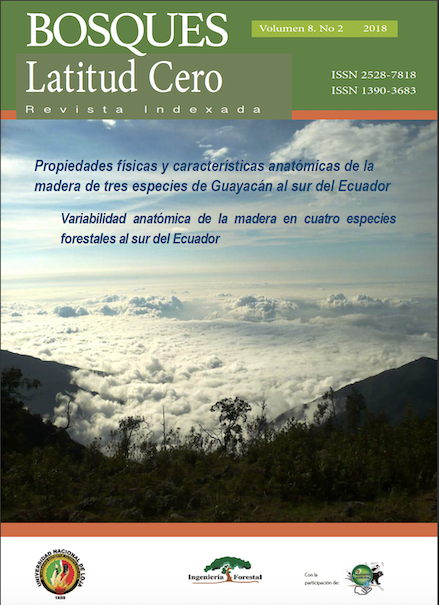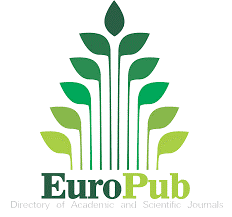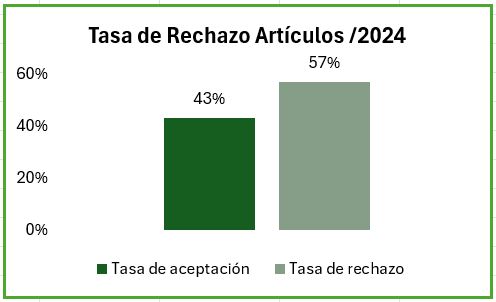Bibliometric analysis of forestry engineer thesis of the National University of Loja, 2013-2017
Keywords:
Forestry engineering, thesis, scientific production, bibliometric analysisAbstract
The thesis of forestry degree of the UNL for the period 2013-2017 was analyzed using bibliometric indicators, with the following objectives: characterizing the thesis documents, analyzing the bibliographical references and the categories of the main subjects. From the repository of the UNL / AARNR 48 theses were extracted, indicating in bibs the bibliometric variables, analyzed with the Excel® program for Windows 2016 and subjected to the descriptive statistics analysis. The varia-bles investigated were: author's sex, annual productivity, extension (number of pages), geographical location of the place of performance; volume of references, type of support, category of support type, language, age (obsolescence); category of specific topics in forest sciences, according to the FAO classification. The results show, as outstanding aspects, a greater proportion of male authors, more than 80% of works with an average of 90 pages and 65 bibliographic references; about 80% of this variable is supported in printed works and in Spanish, the age of almost 70% is between 0 and 15 years; the most researched subcategories were forest sciences in general, forest measurement and forest species.References
Ardanuy, J. (2013). Análisis de los estudios bibliométricos en Cataluña. Recuperado de
http://bid.ub.edu/es/32/ardanuy2.htm
Amézquita López, J. A.; Martínez Torres, D. C.; Martínez Torres, J. C. y Maza Ávila, F. (2011). Bibliometría, infometría y cienciometría. Cartagena, Colombia: Ediciones Unicartagena.
Arenas, S. y Romero, A. (2003). Indicadores bibliométricos de la revista científica Zootecnia Tropical. Zootecnia Tropical 21(3). Recuperado de
www.scielo.org.ve/scielo.php?pid=S0798-72692003000300007&script=sci_arttext
Armengol López, N. (2017). Estudio bibliométrico de la revista Pastos y Forrajes y su relación con los cambios de paradigma de I+D+i en la EEPF Indio Hatuey (Tesis de maestría, Universidad de Matanzas, Cuba). Recuperado de
https://www.researchgate.net/publication/323178041_Estudio_bibliometrico_de_la_revista_Pastos_y_Forrajes_y_su_relacion_con_los_cambios_de_paradigma_de_IDi_en_la_EEPF_Indio_Hatuey
Babini, D. (2011). Acceso abierto a la producción científica de América Latina y el Caribe: identificación de principales instituciones para estrategias de integración regional. Revista Iberoamericana de Ciencia, Tecnología y Sociedad – CTS, 6(17), 1-24. Recuperado de
http://www.redalyc.org/articulo.oa?id=92422634002
Baldazo Molotla, F. A. (2016). Sustentabilidad en empresas familiares rurales: estudio bibliométrico e indicadores (Tesis de maestría, Instituto Politécnico Nacional, México).
Escorcia Otálora, T. A. (2008). El análisis bibliométrico como herramienta para el seguimiento de publicaciones científicas, tesis y trabajos de grado (Tesis de pregrado). Pontificia Universidad Javeriana, Bogotá, Colombia.
Iannacone, J.; Romero, S.; Guabloche, A. y Alvariño, L. (2017). Investigación bibliointegrativa de las tesis de pregrado y postgrado sobre biodiversidad en las universidades de Lima, Perú. Cátedra Villarreal, 5(2), 149-158. Recuperado de
Masuelli, R. W., Amoretti, M. L., Agüero, N. V. y Darre, M. (2017). Análisis biliométrico de la producción científica de la Facultad de Ciencias Agrarias, Universidad Nacional de Cuyo, Argentina. Recuperado de
http://revista.fca.uncu.edu.ar/images/stories/pdfs/En_prensa/Masuelli.pdf
Meneses Aguirre, B., Romero Pedraza, E. y Sesma-Muñoz, B. (2013). Análisis y evolución de las referencias de las tesis de un posgrado en la Universidad Veracruzana. Revista Ciencia Administrativa (1), 34-38.
Montilla Peña, L. J. (2016). Análisis de la producción científica de los artículos de la Revista Zootecnia Tropical del Instituto Nacional de Investigaciones Agrícolas (2006-2013). Biblios (65), 1-14. Recuperado de
Pacheco-Mendoza, J. y Milanés Guisado, Y. (2009). Evaluación de la ciencia y los estudios bibliométricos. Recuperado de
www.unmsm.edu.pe/veterinaria/files/evaluacion_de_la_ciencia.pdf
Prince-Perciballi, I. (1983). Esquema de categorías de materias AGRIS/CARIS. (Trad. Hugo Cáceres Ramos; María José Galrao). San José, Costa Rica: IICA/CIDIA.
Rojas-Moreno, B., Cásares, M., Viloria, F y Chaparro-Martínez, E. (2013). Análisis bibliométrico de la literatura científica publicada en la revista de la facultad de ciencias veterinarias de la Universidad Central de Venezuela, período 2001-2011. II. Indicadores de consumo. Revista de la Facultad de Ciencias Veterinarias 54(2), 1-14.
Saavedra-Fernández, O.; Sotolongo-Aguilar, G. y Guzmán-Sánchez, M. V. (2002). Medición de la producción científica en América Latina y el Caribe en el campo agrícola y afines: un estudio bibliométrico. Rev. Esp. Doc. Cient. 25(2), 151-161. Recuperado de
http://redc.revistas.csic.es/index.php/redc/article/view/96/159
San Martín H., F., y Pacheco M., J. (2008). Análisis bibliométrico de las tesis de pregrado de la Facultad de Medicina Veterinaria de la Universidad Nacional Mayor de San Marcos en el período 2001-2006. Recuperado de
www.scielo.org.pe/scielo.php?script=sci_arttext&pid=S1609-91172008000100...
Valle, R. y Salvador, E. (2009). Análisis bibliométrico de las tesis de pregrado de la Facultad de Medicina de la Universidad Nacional Mayor de San Marcos. Recuperado de
http://revistas.concytec.gob.pe/scielo.php?script=sci_arttext&pid=S1025-558320090.
Downloads
Published
How to Cite
Issue
Section
License
Copyright (c) 2018 Bosques Latitud Cero

This work is licensed under a Creative Commons Attribution-NonCommercial-ShareAlike 4.0 International License.
This work is published under the Creative Commons Attribution-NonCommercial-ShareAlike 4.0 International (CC BY-NC-SA 4.0) license. This means that users may copy, distribute, and adapt the content, provided that proper credit is given to the authors and the journal. Commercial use of the material is not permitted. Additionally, any derivative work must be distributed under the same license. This license ensures open access to knowledge, promoting the dissemination and reuse of published works for non-commercial purposes, respecting authorship, and ensuring the free circulation of content under fair terms.





























